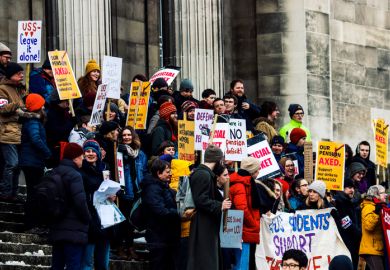CVs and interviews are being removed from university hiring processes under a new approach to “de-bias” academic recruitment being pioneered in the UK.
The “Recruiting for Difference” approach, billed as an attempt to address biases around gender, ethnicity and university background, is led by the recruitment firm Diversity by Design, co-founded by the writer and broadcaster Simon Fanshawe, former chair of council at the University of Sussex.
Mr Fanshawe, a founder of the LGBT equality charity Stonewall, said the aim was to “de-bias” to the greatest extent possible, explaining that, under this approach, “what you don’t use in the shortlisting process at all is CVs”. He argued that stripping out CVs allowed universities to see the true qualities of the people they were considering for jobs.
The application process allows applicants to state which journals they have published in and the roles they played in these papers. But candidates’ names do not figure in the shortlisting process – thus their gender and ethnicity are not revealed – and at no stage of the hiring process is it disclosed at which universities candidates have worked or studied.
Mr Fanshawe asked: “Why do [those hiring] want to know what university [applicants] went to?” One explanation is that those doing the hiring “are simply biased and…think if people went to Cambridge, they are better,” he added. “Well, that’s not a good reason for knowing which university they went to because it may not be true.”
So far, the approach has been used to recruit to two posts in the University of Nottingham’s Faculty of Engineering, both of which were taken by women. Fifteen per cent of applicants and 35 per cent of those shortlisted were women.
The Engineering and Physical Sciences Research Council has awarded a grant to a project led by Nottingham, on which Diversity by Design is a partner. This will include the development of “software, training and accreditation” for the de-biasing recruitment approach, said Mr Fanshawe.
Nottingham initiated another innovation, Mr Fanshawe said – removing traditional interviews from the hiring process. Interviews do not reflect what academics do in their jobs, which is “teach”, “present their research” and “discuss their research with their peers at a high level”, he added. The interview has been replaced by three “simulations” of these aspects.
While there are “tons of initiatives” on diversity in higher education, these are not tackling “one of the big roots of the problem – which is the…level of supposition, or bias, or preference, or whatever you want to call it, which is built into the way in which…academics…are recruited”, he said.
Asked how universities would benefit from more diverse recruitment, Mr Fanshawe said that in teaching and research, it would lead to “new areas of enquiry”, with combinations of “different insights” bringing “higher quality results”.
Universities are also teaching to a “much more diverse group of students”, and lecturers can “fuel ambition” for students by serving as role models, he said.
Mr Fanshawe – whose firm is currently working with Newcastle University to recruit an engineering materials professor, cited the research of Iris Bohnet, the Harvard University behavioural economist, as a key influence on the approach. Her research showed that diversity training and work to address unconscious bias “doesn’t do it”, Mr Fanshawe said. “We can’t train ourselves out of these habits. We have to design the processes to enable us to make better decisions.”
Register to continue
Why register?
- Registration is free and only takes a moment
- Once registered, you can read 3 articles a month
- Sign up for our newsletter
Subscribe
Or subscribe for unlimited access to:
- Unlimited access to news, views, insights & reviews
- Digital editions
- Digital access to THE’s university and college rankings analysis
Already registered or a current subscriber?










